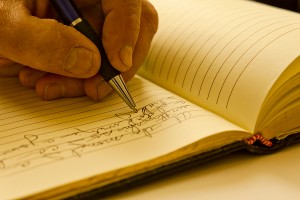I’m not sure about you but I know when my anxiety kicks into high gear, my thoughts tend to jump on board. When we get anxious, it usually causes our thoughts to race and go in circles. We start hyper-focusing on details and it can keep us up at night.
When we are anxious because of our relationships, it can feel twice as hard because we can never be certain of what the other person is thinking. Additionally, our natural desire to want to take control of the situation doesn’t help because we have to take another person’s needs and feelings into account. Our mind jumps from questions to solutions and back again in an attempt to make sense of things but it often doesn’t help reduce our anxiety.
Anxiety wreaks havoc on our system and our ability to feel okay. It makes day to day tasks seem hard to focus on and complete, and time either speeds up or goes painfully slow. Taking your anxiety out on your relationships is toxic and usually causes more harm than good, so what is something we can do when you are anxious and stuck trying to find ways to make yourself or your relationships better?
Journal. I know this may feel uncomfortable for you if you aren’t someone who typically writes things down but research has shown that putting pen to paper actually allows our brains to process and integrate things in a different manner than simply keeping it in our head. By writing, you give your thoughts and feelings a place to belong. It doesn’t solve all your  problems but it does create an opening in the circuit so that the thoughts that keep racing around your mind have a place to go. It also can allow you to decipher which thoughts are reoccurring (you will start realizing the themes that keep coming up) which will tell you what is really bothering you, and therefore what may be most important to actually talk about with your partner.
problems but it does create an opening in the circuit so that the thoughts that keep racing around your mind have a place to go. It also can allow you to decipher which thoughts are reoccurring (you will start realizing the themes that keep coming up) which will tell you what is really bothering you, and therefore what may be most important to actually talk about with your partner.
So here is what I recommend: Find an old journal, a scrap piece of paper or open a word document on your computer and start writing. Don’t think about what you are writing, don’t focus on how it is coming out and definitely don’t reread what you have written. If you start to focus too much on having it come out properly you are sensoring your thoughts and emotions which defeats the purpose. Rereading what you have written usually only makes you feel worse about things or yourself and can sometimes even make things more confusing. The purpose of this exercise is simply to create enough room in your head to properly sort through your thoughts and feelings. It isn’t to come up with magic answers, nor is it going to heal all wounds, but it will create space so that you can think clearly instead of anxiously.
So let it all out, the good, the bad and the ugly. Allow your brain to process things simply by getting things out. The brain has an uncanny ability to make sense of things even without studying them. If there is more to write, then write it. And at the very end, close the book, delete the word document or burn the piece of paper. The exercise is done, so let it go and let the answers slowly become clear.



Hi Kaela,
This is where I run into a road block…I realize I sensor my journaling and don’t understand what it means to just write…my mind goes crazy with what its supposed to look like!!! How do I start??? All these things race thru my mind…is there workshops on how to journal effectively?
Hi Sue,
You’re not alone!! I think most of us, myself included at times, sit down to write and then try to find all the “right” things to say and the “right way” to say them. As for how to start, the best thing I recommend is to just put pen to paper, to be in a place that emotionally connects with you (where you feel comfortable, safe, supported) and begin. Perhaps you set the goal to write for five minutes without thinking and then can go back to processing or structuring your journal. As much as we don’t think so, journalling is an art and it takes practice to let it just flow. Do you ever have those moments where you are experiencing something really rich (whether that be a good feeling or a painful feeling) and you can feel so much stuff coming up for you? Those are the moments you want to try to write without sensoring. I love the art of having an actual book that you write in, but I also know that for many as soon as it comes to writing things down on paper they start to really sensor themselves. If this happens to you, and you find writing on the computer comfortable, maybe that is the place to start. The one added benefit of a computer is you can turn the screen to black and keep writing which means you aren’t staring at what you are saying. This could be a place to start and then transfer over to paper from there.
I haven’t done a lot of research on journalling workshops but it is a great idea. Let me look into it and if I find anything I will be sure to post it back here for you, and others, to see!
Thanks so much for commenting Sue and have a great day!